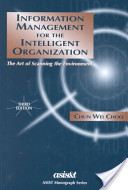Introduction
Information culture is the important component of an organization. Information culture is a strategic goal and should be planned for as much as the transformation of physical resources (Ginman, Information Culture and Business Performance (1988), International Association of Technological University Libraries (IATUL) Quarterly).
Adrienne Curry and Caroline Moore are often cited authors in the studies about information culture. In their article Assessing Information Culture - an Exploratory Model, Information culture is defined as:
| A culture in which the value and utility of information in achieving operational and strategic success is recognised, where information forms the basis of organizational decision making and Information Technology is readily exploited as an enabler for effective Information Systems. |
As we can see above, the concept of Information Culture is linked with the concepts of Information Technology and Information Systems.
In the wide range of approaches Information Culture is closely linked with information technology and digital world.
An interesting approach to the Information culture is in the article From the Philosophy of Information to the Philosophy of Information Culture by Adam Briggle and Carl Mitcham.
Some suggestions from the article:
|
The
technological and economic changes associated with the information
society are accompanied by cultural changes, including lifestyles,
patterns of consumption, and modes of cognition and experience.
- - -
What cultural studies helps us see, however, is that information
culture cannot be understood solely in terms of extrinsic information
“impacting” pre-established cultures. Rather, the term asks us to
conceive of distinctive information cultures, the values and practices
of which are constituted by and oriented around information —
information as culture, not just information for, in, or about culture.
This phenomenon has gone under several names including new media
culture, Internet culture, and cyberculture.
- - -
Our suggestions have been motivated by an effort to extend the
philosophy of information into a philosophy of information culture in
ways that might bridge tensions between engineering expansionist and
humanities limitationist approaches to the philosophy of technology in
general and of information technology in particular.
|
